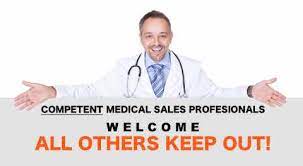In the dynamic and competitive field of medical device sales training programs, success hinges on more than just product knowledge. A well-rounded and effective medical sales training program is crucial for sales representatives to navigate the intricacies of the healthcare industry and build lasting relationships with healthcare professionals. This article delves into the key components of a successful medical sales training program, offering insights into its importance and outlining strategies for implementation.
Understanding the Healthcare Landscape:
Before delving into the specifics of medical sales training, it’s imperative to comprehend the complex healthcare landscape. From regulatory frameworks to evolving treatment modalities, sales representatives must stay abreast of industry changes. A comprehensive training program should include modules on healthcare trends, compliance, and an overview of the healthcare ecosystem to empower sales professionals with the knowledge necessary for successful interactions with healthcare providers.
Product Knowledge:
While it may seem obvious, a deep understanding of the products or services being sold is foundational to medical sales success. Sales representatives should be equipped with in-depth knowledge about the features, benefits, and competitive advantages of their offerings. The training program should focus on conveying this information effectively, ensuring that representatives can articulate the value proposition of their products with confidence.
Communication Skills:
Effective communication is paramount in medical sales, as representatives must engage with healthcare professionals, administrators, and other stakeholders. Training programs should emphasize not only the importance of clear and concise communication but also the ability to tailor messages to different audiences. Role-playing exercises and simulations can be valuable tools to hone these skills in a controlled environment.
Relationship Building:
Building and maintaining relationships is a cornerstone of successful medical sales. Training programs should include modules on relationship-building strategies, understanding the needs of healthcare professionals, and fostering trust. Techniques such as active listening and empathy should be emphasized to enable representatives to connect with clients on a deeper level.
Navigating Regulatory Compliance:
The healthcare industry is heavily regulated, and adherence to compliance standards is non-negotiable. A robust medical sales training program should thoroughly cover regulatory requirements, ensuring that representatives are well-versed in compliance protocols. This includes understanding industry-specific regulations, data privacy laws, and ethical considerations to mitigate legal risks.
Adapting to Technological Advancements:
The integration of technology in healthcare is transforming the sales landscape. Training programs should address the utilization of digital tools, data analytics, and customer relationship management (CRM) systems. Sales representatives need to be proficient in leveraging technology to streamline processes, analyze data for strategic decision-making, and enhance customer engagement.
Continuous Learning and Development:
The healthcare industry is ever-evolving, and successful medical device sales training programs embrace a mindset of continuous learning. Training programs should instill this philosophy, encouraging ongoing education and professional development. This can be achieved through regular updates on industry trends, product enhancements, and additional training sessions to reinforce and expand knowledge.
Conclusion:
In conclusion, a well-designed medical device sales training programs program is the linchpin of success in the competitive healthcare marketplace. By combining a deep understanding of the healthcare landscape, product knowledge, effective communication skills, relationship-building strategies, regulatory compliance, technological proficiency, and a commitment to continuous learning, sales representatives can position themselves for long-term success. As the healthcare industry continues to evolve, a well-trained and adaptable salesforce will remain a valuable asset in driving growth and building lasting partnerships.

